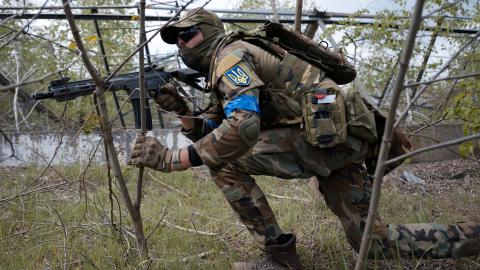Executive Summary
- Battlefield assessment: The Russian military intensified its combat operations on multiple fronts in advance of a likely summer offensive.
- Evolving tactics: Ukraine countered Russia’s increasing use of frontline motorcycle attacks with “assault biker” units of its own.
- Ukrainian leadership turmoil: A battalion commander in the Ukrainian 47th Mechanized Brigade abruptly resigned on May 18.
1. Battlefield Assessment
Last week the front lines near Toretsk continued to witness high-tempo combat operations. Russian forces also pressed toward the Siversk-Kramatorsk axis, the long-embattled town of Chasiv Yar, the Orikhiv sector in southern Ukraine, and the area around Pokrovsk—a critical node in Ukraine’s eastern defensive architecture.
Ukrainian units continued to demonstrate their ability to adapt to Russian tactics. Kyiv’s latest innovation is its formation of a Mad Max–style assault biker unit to counter Russia’s use of frontline motorcycle charges, which Ukrainian forces refer to as “banzai attacks.” Ukraine’s 425th Separate Assault Regiment, nicknamed Skala, is using motorcycles to quickly penetrate Russian defenses while avoiding drone strikes. This new tactic demonstrates the evolution of small-unit operations in the war. Fast, light attacks suffer high rates of casualties but can occasionally succeed in drone-heavy environments where conventional armor is even more vulnerable.
Following the Kremlin’s success in expelling Ukrainian forces from Kursk Oblast, Russian military planners are eyeing Ukraine’s Sumy Oblast. Since diplomatic discussions in Istanbul failed to deliver a viable ceasefire plan, a large-scale Russian summer offensive is likely.
A Russian offensive in Kharkiv is also highly probable. In this effort, Russian combat formations may double down on their force-on-force and force-to-terrain ratio advantages to wear down the Ukrainian military in a prolonged war of attrition. Completing the invasion of eastern Ukraine will almost certainly be Russian President Vladimir Putin’s summer priority. In recent weeks the Russian offensive in the eastern sector has focused on severing Ukraine’s lines of communication along the H-32 Highway connecting the Pokrovsk front to Kostyantynivka.
Drone warfare also continued to play an important role in the war. The Russian Aerospace Forces remained active in Ukraine’s airspace, where they delivered modified aerial glide bombs and missiles. Both belligerents maintained their widespread use of first-person-view (FPV) drones controlled by fiber-optic cables across the battleground. These robotic warfare assets were effective against a variety of platforms, including T-72B3M main battle tanks, other drones, and even Lancet loitering munitions. Visuals from the battlefield show Russian Yolka man-portable drones engaging Ukrainian unmanned aerial systems. Evidence suggests that Russian rotary-winged manned platforms now carry 9M39 Igla-V missiles designed to intercept Ukrainian drones.
2. Elite Ukrainian Brigade Faces Command Turmoil
A battalion commander in Ukraine’s 47th Separate Mechanized Brigade, Oleksandr Shyrshyn, has resigned. He alleges that Ukraine’s military leadership has subjected his units to needless deaths and “stupid objectives.”
Shyrshyn’s brigade, commonly called Magura, was constituted from scratch in 2022 to fight in Ukraine’s planned summer 2023 counteroffensive. Its servicemen received new, high-end Western equipment and training in North Atlantic Treaty Organization (NATO) member nations. In 2024, the brigade participated in combat operations in Kursk.
The 47th Mechanized Brigade is one of the most elite and battle-hardened combat formations in the Ukrainian Army. The Ukrainian General Staff reacted immediately to the sudden vacancy in the brigade’s ranks, initiating an internal investigation on May 18 following Shyrshyn’s resignation. This report will continue to monitor the investigation and assess the shifting internal dynamics of Kyiv’s military leadership.

















